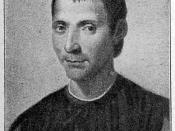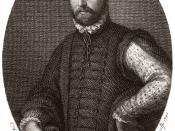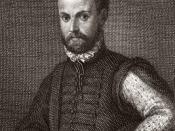In Niccolo Machiavelli's The Prince and Aristotle's The Politics, two very different ideas on the subject of virtue have been proposed. In The Prince, Machiavelli states that "there is no virtue which it is more necessary for him [The Prince] to seem to possess than this last [religion]; because men in general judge rather by the eye than by the hand..." (47). Machiavelli believes that a successful Prince needs to only portray himself as virtuous because humans are naturally short-sighted and will judge by appearance rather than knowing the Prince and his true intentions. The intentions of any successful Prince must be for the sake of keeping power. On the contrary, Aristotle believes that humans practice virtues because embracing them are what it means to be happy. In this essay then, I will present a response that Aristotle would make to Machiavelli's claim above by examining each of their positions on the subject of virtue.
Machiavelli thought virtues were one's desirable strengths or admirable characteristics that one should only use to take advantage of a given opportunity and further secure his end goal of power. When speaking of princedoms acquired by one's own arms and merit, Machiavelli states, "we shall see they were debtors to Fortune for nothing beyond the opportunity which enabled them to shape things as they pleased" (Prince, 13). Such is the case in Moses and the people of Israel. Moses was given an opportunity to free the enslaved and oppressed Israelites who were under the control of the Egyptians. Much like any leader who has acquired his princedom through embracing virtue, Moses only manifested his strengths and excellence to shape the opportunity in an advantage that serves to his ways. These Princes do not aquire power without difficulty, but rather they easily hold on to...


